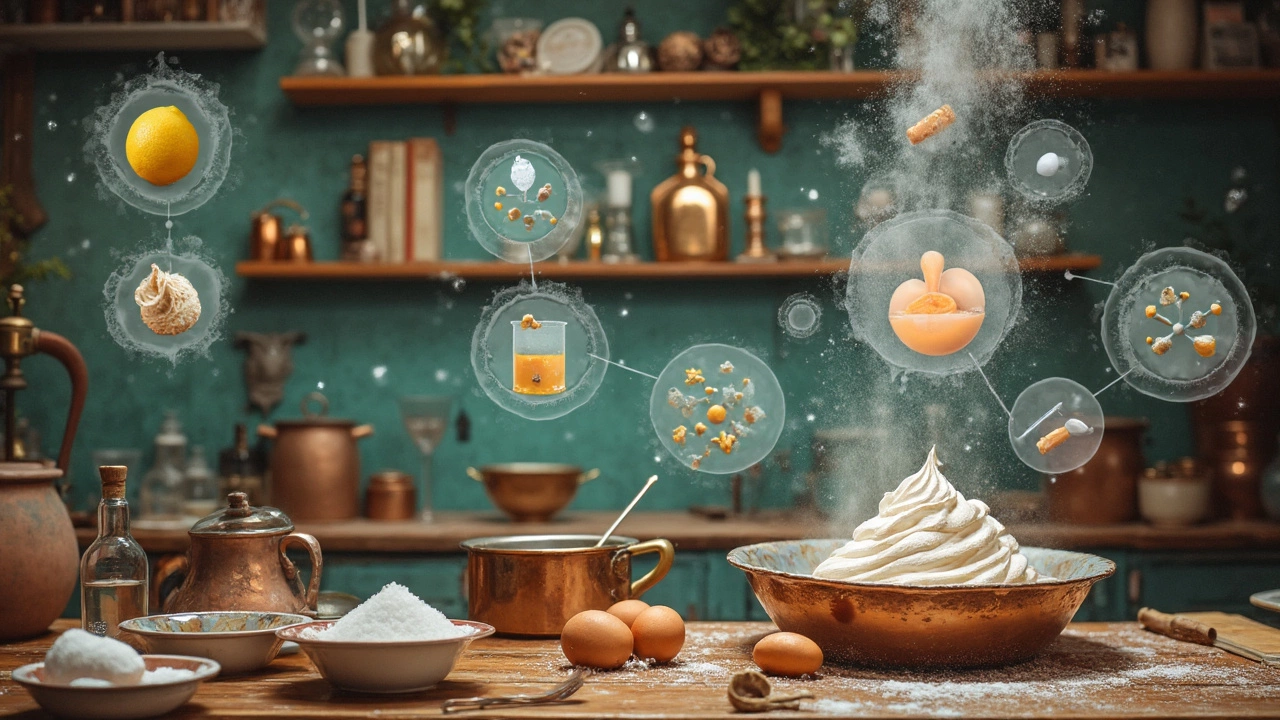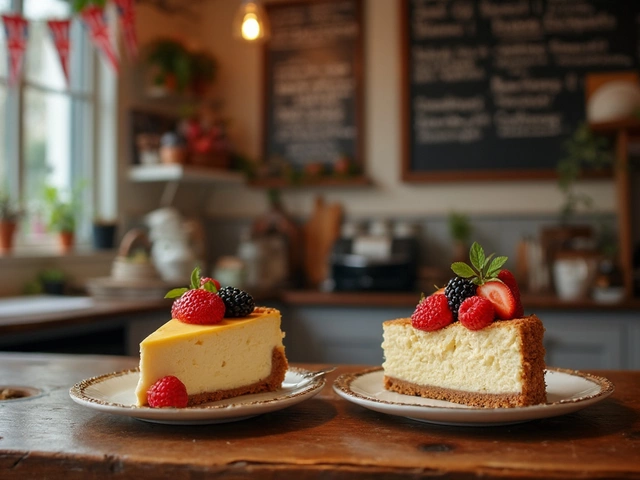So, you're in the middle of crafting the perfect pavlova, and you've just realized you're out of white wine vinegar. Panic ensues, right? Not necessarily. Many home bakers have found themselves in this exact situation and turned to lemon juice as a potential savior. But does it work?
First off, it's all about the acidity. Acidity helps stabilize the meringue, preventing those deflating disasters. White wine vinegar, known for its milder taste, is a popular choice. But lemon juice, with its tart punch, might change the game.
The big question is, will it alter the taste and texture of your pavlova? If you're thinking of giving lemon juice a whirl, it's worth considering how its strong citrus flavor might interact with the rest of your ingredients. Some adventurous bakers love the lemony twist, while others swear by vinegar's subtlety.
For a successful swap, a little goes a long way. Lemon juice is more acidic than vinegar, so a reduced amount might be all you need. And, of course, mixing it evenly is key to preventing any localized bursts of citrus in your meringue.
- Why Acidity Matters in Meringue
- Lemon Juice: Friend or Foe?
- Taste and Texture Considerations
- Tips for Successful Pavlova
- Expert Opinions and Insights
Why Acidity Matters in Meringue
Meringue without the right acidity is like a cake without sugar—missing the magic touch. It's a simple mix of egg whites and sugar, but the real secret lies in the acid. The role of acidity is crucial because it strengthens the egg whites, making them more stable. The main culprits for saving your meringue from collapse are tartaric acids like lemon juice or white wine vinegar.
Strengthening the Structure
When you whip those egg whites, you're creating a network of proteins that trap air, giving meringue its volume. Acidity helps tighten this protein web, ensuring it keeps its shape. It also helps the sugar dissolve better, contributing to that glossy, smooth finish we all love.
Taming the Flavors
Another unsung hero? Acidity balances sweetness. Meringue can easily feel too sugary, but a touch of lemon juice or vinegar counteracts that, offering a pleasant tang. This delicate balance enhances other flavors in your pavlova, like fresh fruits or creamy toppings.
Science Behind The Scenes
Here's an interesting bit: low pH levels in acids help to denature the proteins in egg whites faster, which increases the foam's stability. According to a survey of popular baking guides, enzymes in lemon juice can add that fluffy marshmallow quality—ideal for a light pavlova.
Acids To Choose From
- White wine vinegar: Mild, unobtrusive, and classic.
- Lemon juice: Tangy, flavorful; perfect for citrus-themed desserts.
- Cream of tartar: The traditional choice, effective, but lacks flavor complexity.
While white wine vinegar reigns in traditional recipes, adventurous folks swear by lemon juice for its added flavor profile. When choosing for your next meringue masterpiece, think about both taste and chemistry to make an informed decision.
Lemon Juice: Friend or Foe?
Swapping lemon juice for white wine vinegar in a meringue may seem like a clever move. But, before you squeeze away, let’s consider if it’s truly the right fit.
Acid Levels and Flavor Impact
Lemon juice is indeed more acidic than white wine vinegar. This means, technically, you can use less of it to achieve a similar stabilizing effect. Now, that’s handy when you’re low on ingredients, but there's a flavor factor to weigh in. Lemon’s distinctive zing can infuse the meringue with a fresh, zesty dimension. This might be a bonus if you're a lemon lover, but it can clash with your toppings if you’re not careful.
How to Substitute Effectively
When making the switch in your pavlova recipe, start small. Use about half the amount of lemon juice compared to white wine vinegar. Taste and fine-tune if necessary. Here’s a simple gauge: if a recipe calls for 1 teaspoon of white wine vinegar, begin with just over a half teaspoon of lemon juice.
Textural Twists
Texture is vital in meringues. Too much acidity or moisture from lemon juice might risk a soggier finish. Stir in the lemon juice gently after achieving stiff peaks to maintain structural integrity. Remember: a dash too much could deflate that airiness you crave.
Experiment and Enjoy
The fun of baking lies in experimentation. If lemon complements your dessert’s flavor profile, give it a shot! On the taste-o-meter, lemon might be both a friend and a foe depending on your preferences. So, approach with an adventurous heart!
At the end of the day, what matters is knowing your ingredients and their effects. With a bit of creativity, even the most unlikely substitutes can turn into delightful discoveries.

Taste and Texture Considerations
When thinking about swapping white wine vinegar for lemon juice in meringue, it's important to keep in mind how this will impact both taste and texture. Meringue is quite the sensitive mix!
Taste Impact
Lemon juice naturally has a stronger flavor than white wine vinegar. While vinegar just stabilizes the egg whites without much additional flavor, lemon juice contributes a zesty kick. This can be a delightful change if you're a fan of citrus, but it might clash with other flavors in your pavlova recipe if you're not careful.
Here's a handy tip: when using lemon juice, consider using it in pavlova variations that incorporate fruits like berries or tropical fruits that complement the citrus notes. Play around with flavors and make it your own.
Texture Changes
As for texture, both acid sources help create that light and airy meringue by ensuring the egg whites break down just right during whisking. However, the higher acidity level in lemon juice can sometimes cause a bit more foaming. It's not necessarily a bad thing, but it can make the egg whites whip up a little faster and potentially become over-beaten if not watched closely.
A cool tip for texture is adding a touch less lemon juice than you would vinegar. Generally, you might use about half the amount. This helps maintain the balance, avoiding overly frothy whites.
Balancing Act
Ultimately, balance is key. While lemon juice is more acidic than white wine vinegar, a splash can be just right for that added zing without overpowering your dessert.
Let's sum it up with a basic fact check:
| Ingredient | Acidity Level | Flavor Profile |
|---|---|---|
| White Wine Vinegar | Mild | Subtle |
| Lemon Juice | Strong | Zesty |
So, if you're looking to bring in a new layer of taste to your pavlova with the use of lemon juice, it's essential to be mindful of how much you use and what flavors you combine it with. A little can go a long way in flavor boost without messing with that crucial airy texture!
Tips for Successful Pavlova
Creating a pavlova that's both beautiful and delicious can seem like a daunting task, but with some practical tips, you'll be set for success. Whether you're using lemon juice or white wine vinegar, these pointers will help you nail it every time.
1. Prep Your Ingredients
Before you start, ensure every tool, from your mixing bowl to the whisk, is spotless. Any oil or residue can ruin your meringue. Separate your eggs carefully—little yolk sneaks in, and there goes the meringue!
2. Whipping the Egg Whites
Begin at a low speed and gradually increase. This slow start helps build a stable structure. Look for soft peaks before adding sugar. Speaking of sugar, add it gradually; rushing leads to grainy meringue.
3. Acidity for Stability
Whether you're team lemon juice or white wine vinegar, a bit of acid is crucial. It stabilizes the egg whites, giving you a voluminous and firm meringue. Just remember, a teaspoon of lemon juice doubles the kick compared to vinegar.
4. Baking Low and Slow
Patience is key. A slow bake at around 250°F (120°C) ensures even cooking without browning. You're essentially dehydrating the meringue rather than quickly baking it.
5. Cool Down
Let your pavlova cool in the oven with the door slightly ajar. Sudden changes in temperature can cause it to crack, which, while adding character, can be disheartening after all that work.
| Oven Temperature | Dehydration Time |
|---|---|
| 250°F | 1.5 - 2 hours |
Mastering these tips can transform your pavlova from good to fantastic, regardless of whether you're switching from vinegar to lemon juice. Keep experimenting, and don't sweat the small stuff too much. It's all part of the fun!

Expert Opinions and Insights
When it comes to backing up kitchen experiments like swapping lemon juice for white wine vinegar in a meringue, some culinary experts have some thoughts worth sharing.
Acidity Levels and Meringue Stability
Chef Alice Tompkins, known for her expertise in molecular gastronomy, highlights that lemon juice brings a natural acidity that, while higher than vinegar, can stabilize the egg whites similarly. But she warns, 'a little too much, and you might overpower the dish with a citrusy punch.'
Taste and Texture Nuances
Karen McDowell, a pastry chef with two decades of experience, mentions, 'If you're after a classic pavlova taste, the lemon might be a detour. But, it could also be a delightful twist.' She suggests reducing the usual amount of vinegar by about 25% when using lemon juice to maintain that balance without going overboard.
Lemon Juice: A Secret Ingredient?
Interestingly, in some restaurants, the hint of lemon is leveraged intentionally. James Barrett, a winner in international pastry contests, sometimes switches to lemon juice for its aromatic contribution. 'There's a vibrant freshness that's hard to beat,' he claims.
Studies on Ingredient Variations
A small study conducted by the Culinary Institute found that using lemon juice resulted in a slightly firmer structure in meringues. While tasters were divided on flavor preference, lemon lovers adored the zestiness.
| Ingredient | Acidity (pH) | Preferred By |
|---|---|---|
| White Wine Vinegar | 2.5 - 3.0 | Traditionalists |
| Lemon Juice | 2.0 - 2.6 | Adventurers |
In the end, using lemon juice instead of white wine vinegar in your meringue comes down to personal taste and the kind of experience you're aiming for. Expert opinions suggest that with a bit of testing and adjustment, you could discover a whole new favorite.





